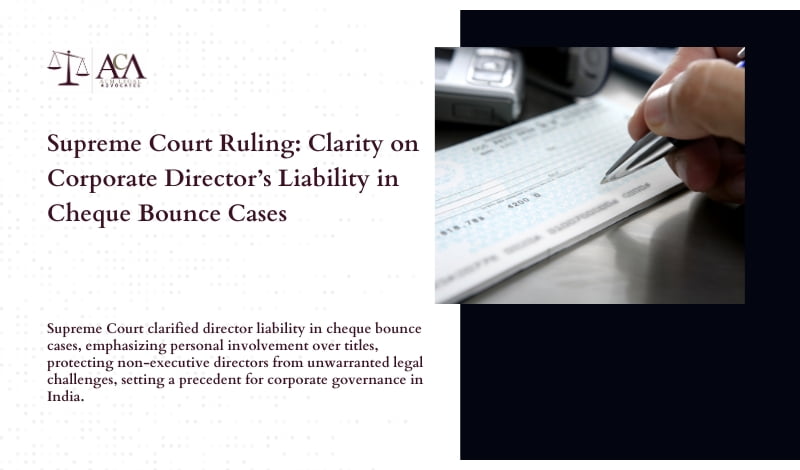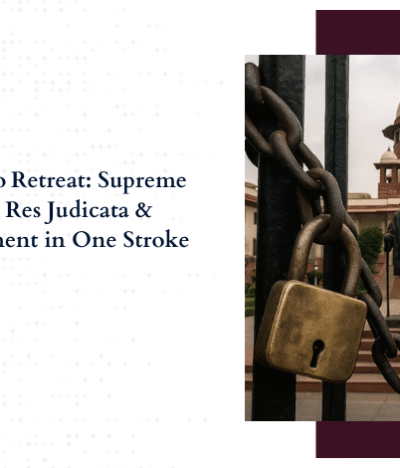The Supreme Court of India rendered a landmark judgement on March 15, 2024, in the case Susela Padmavathy Amma vs. M/S Bharti Airtel Limited [2024 INSC 206]. This judgement has set a precedent that clarifies the conditions under which directors of a company can be held liable under the Negotiable Instruments Act, 1881, specifically under Sections 138 and 141.
The ruling is particularly significant for corporate directors who do not partake in the day-to-day operations of their businesses but face legal challenges due to their titles.
Context
The controversy stemmed from criminal appeals filed against the judgement and order dated April 26, 2022, passed by the High Court of Judicature at Madras, which had rejected the plea for quashing of C.C. Nos. 3151 & 3150 of 2017 under the offence punishable under Section 138 read with Section 142 of the Negotiable Instruments Act 1881. The appellant, Susela Padmavathy Amma, a director of M/s. Fibtel Telecom Solutions, was implicated due to her position despite not being involved in the company’s daily operations.
Factual Background and Procedural History
The dispute originated when M/s Bharti Airtel Limited, the respondent, filed complaints against M/s. Fibtel Telecom Solutions and its directors, including Susela Padmavathy Amma, for failing to clear dues amounting to Rs. 25,508,309. In response to these unpaid debts, Fibtel Telecom Solutions provided post-dated cheques, which were subsequently dishonoured with the reason “payment stopped by drawer”. Consequently, Bharti Airtel initiated legal proceedings under Section 138 of the N.I. Act against the company and its directors.
Susela Padmavathy Amma, designated as Accused No. 3, approached the High Court of Judicature at Madras seeking quashing of the complaints under Section 482 of the CrPC against her, asserting her non-involvement in the company’s day-to-day affairs and her non-role as a cheque signatory. However, the High Court dismissed her petitions, leading to the appeal in the Supreme Court.
Legal Framework and High Court’s Stance
The legal battle centered around the interpretation of Sections 138 and 141 of the Negotiable Instruments Act, 1881, which dealt with the dishonour of cheques and the consequential liabilities. According to these sections, not only the company but also the individuals in charge of and responsible for its operations at the time of the offence can be held accountable. The High Court, adhering to the traditional interpretation, held that being a director equates to being responsible for the company’s conduct, thereby refusing to absolve Susela Padmavathy Amma of the charges based solely on her directorial position in Fibtel Telecom Solutions.
The High Court’s decision was grounded on the assumption that directors, by virtue of their position, are inherently responsible for the company’s actions, including its financial obligations. This interpretation had significant implications for corporate directors, especially those not involved in the day-to-day activities of their companies, as it placed them in a vulnerable position of being liable for legal actions pertaining to corporate misconduct, such as cheque bouncing, even in the absence of direct involvement or culpability.
Supreme Court’s Analysis and Decision
The Supreme Court’s bench, consisting of Justices B.R. Gavai and Sandeep Mehta, undertook a comprehensive analysis of the matter. Their deliberation was firmly anchored in the interpretation of the Negotiable Instruments Act, 1881, specifically scrutinizing the extent of a director’s liability under Section 141 concerning cheque dishonour cases. The Court meticulously reviewed prior precedents, such as N.K. Wahi vs. Shekhar Singh and others, S.M.S. Pharmaceuticals Ltd. vs. Neeta Bhalla and another, alongside various other landmark decisions to delineate the scope of a director’s responsibility in such matters.
Central to the Court’s reasoning was the distinction between holding a position as a director and being actively involved in a company’s daily management. The justices emphasized that mere designation as a director does not automatically implicate an individual in the operational misdemeanours of a company. Specifically, Justice B.R. Gavai, authoring the judgement, underscored that for a director to be held liable under Section 141, there must be unequivocal averments indicating their involvement and responsibility in the conduct of the business, particularly at the time of the commission of the alleged offence.
The Supreme Court critiqued the High Court’s blanket approach that equated directorship with automatic responsibility for cheque dishonour. The apex court clarified that liability arises not from the title but from the role played in the company’s operations. This significant clarification serves to protect directors who may not have direct involvement in the company’s daily activities from unwarranted legal challenges and liabilities related to cheque dishonoured.
Implications of the Supreme Court’s Judgement
By setting a clear distinction between the roles and liabilities of directors, the Court has provided a sigh of relief to non-executive directors who might not be involved in the day-to-day running of their companies.
This decision underscores the necessity for complainants to establish a clear and direct link between the accused directors and the misconduct leading to the dishonour of cheques. It demands attention to detail in legal proceedings, ensuring that directors are not unduly penalized for the company’s faults without concrete evidence of their direct involvement or negligence.
Concluding Remarks
By reaffirming the principle that liability should be based on personal involvement rather than mere titles, the Court has reinforced the legal protections for directors while maintaining the integrity and accountability mechanisms essential for corporate conduct. This ruling is expected to have lasting effects on the prosecution of cheque bounce cases under the Negotiable Instruments Act and the overall approach towards corporate governance and responsibility in India.
The ruling has elicited a mixed reaction among the legal and business communities. Legal professionals, particularly those specializing in corporate law, have lauded the decision for providing clarity on the scope of directors’ responsibilities and liabilities. This clarity is instrumental in safeguarding the interests of non-executive directors who do not participate in the daily operations of their companies but were previously at risk of being embroiled in legal disputes due to their titular position.
Corporate India, particularly the boards of directors and legal teams, are reassessing their governance structures and legal frameworks in light of this judgement. Companies are now more motivated to ensure transparent and clear demarcations of roles and responsibilities of their board members to prevent similar legal challenges in the future.
Looking Forward
The verdict handed down in this matter is anticipated to be a benchmark in corporate litigation, particularly in cases involving financial instruments like cheques. As the dust settles, the judgement’s long-term impact on corporate accountability, governance and legal practices in India remains to be fully seen. However, it undoubtedly sets a precedent that will influence future litigation and corporate behaviour in the areas of corporate law and financial transactions.






